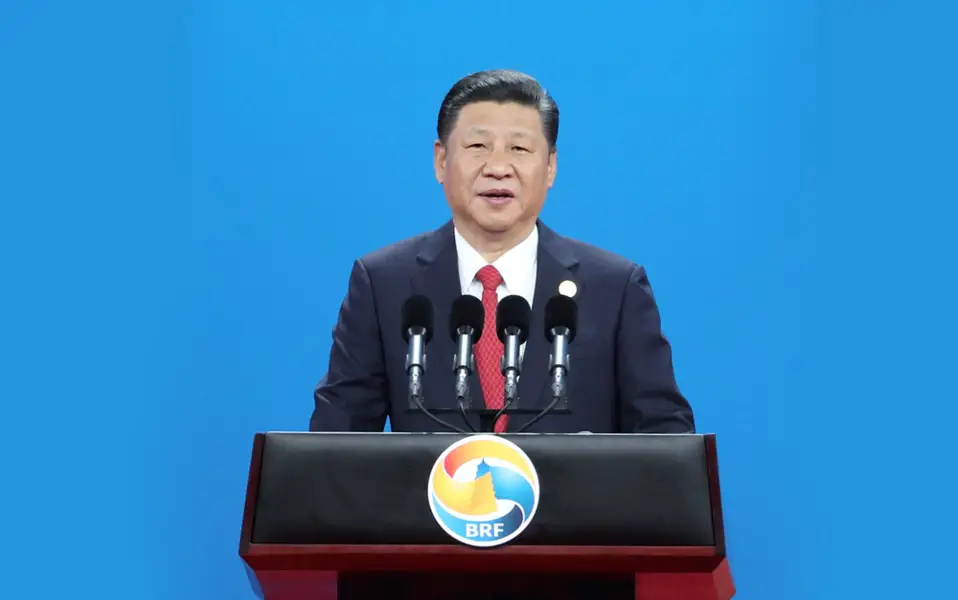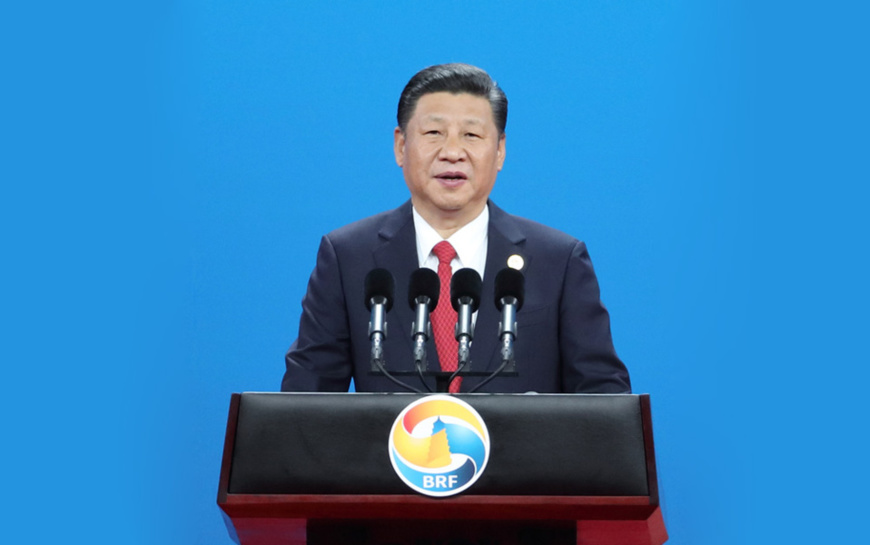By Li Ning from People’s Daily
Chinese President Xi Jinping on Sunday proclaimed the Silk Road spirit, saying it has become a great heritage of human civilization.
Spanning thousands of miles and years, the ancient silk routes embody the spirit of "peace and cooperation, openness and inclusiveness, mutual learning and mutual benefit," he said.
Xi made the remarks when delivering a keynote speech at the opening ceremony of the Belt and Road Forum for International Cooperation in Beijing.
When expounding the spirit of peace and cooperation, he recalled Zhang Qian's well-known journey to the Western regions.
In China's Han Dynasty around 140 B.C., Zhang, a royal emissary, left Chang'an and traveled westward on a mission of peace, opening an overland route linking the East and the West.
Centuries later, in the years of Tang, Song and Yuan Dynasties, such silk routes, both over land and at sea, boomed. Great adventurers, including Du Huan of China, Marco Polo of Italy and ibn Batutah of Morocco, left their footprints along these ancient routes.
In the early 15th century, Zheng He, a famous Chinese navigator in the Ming Dynasty, made seven voyages to the Western Seas, which Xi lauded as "a feat which still is remembered today."
"These pioneers won their place in history not as conquerors with warships, guns or swords. Rather, they are remembered as friendly emissaries leading camel caravans and sailing treasure-loaded ships," Xi said. "Generation after generation, the silk routes travelers have built a bridge for peace and East-West cooperation."
The ancient silk routes, spanning the valleys of the Nile, the Tigris and Euphrates, the Indus and Ganges, and the Yellow and Yangtze Rivers, are also regarded as an emblem of openness and inclusiveness.
The routes connected the birthplaces of the Egyptian, Babylonian, Indian and Chinese civilizations as well as the lands of Buddhism, Christianity and Islam and homes of people of different nationalities and races, Xi said.
They enabled people of various civilizations, religions and races to "interact with and embrace each other with open mind" and foster a spirit of mutual respect, he said."This part of history shows that civilization thrives with openness and nations prosper through exchange," he stressed.
Not for trade only, the ancient silk routes also boosted flow of knowledge, which Xi valued as the spirit of mutual learning.Through these routes, Chinese silk, porcelain, lacquerwork and ironware were shipped to the West, while pepper, flax, spices, grape and pomegranate entered China.
In addition, Buddhism, Islam and Arab astronomy, calendar and medicine found their way to China, while China's four great inventions and silkworm breeding spread to other parts of the world.
"More importantly, the exchange of goods and know-how spurred new ideas," Xi noted."For example, Buddhism originated in India, blossomed in China and was enriched in Southeast Asia. Confucianism, which was born in China, gained appreciation by European thinkers such as Leibniz and Voltaire," he said. "Herein lies the appeal of mutual learning."
Xi also pointed out that the ancient silk routes, which witnessed the bustling scenes of visits and trade over land and ships calling at ports, bear the spirit of mutual benefit.
"Along these major arteries of interaction, capital, technology and people flowed freely, and goods, resources and benefits were widely shared," he said.
He listed the ancient cities of Alma-Ata, Samarkand and Chang'an, ports of Sur and Guangzhou, the Roman Empire, Parthia and Kushan Kingdoms, as well as Han and Tang Dynasties of China, as flags of prosperity boosted by the routes.
"History is our best teacher," Xi said. "The glory of the ancient silk routes shows that geographical distance is not insurmountable."
"If we take the first courageous step towards each other, we can embark on a path leading to friendship, shared development, peace, harmony and a better future," he said.
Spanning thousands of miles and years, the ancient silk routes embody the spirit of "peace and cooperation, openness and inclusiveness, mutual learning and mutual benefit," he said.
Xi made the remarks when delivering a keynote speech at the opening ceremony of the Belt and Road Forum for International Cooperation in Beijing.
When expounding the spirit of peace and cooperation, he recalled Zhang Qian's well-known journey to the Western regions.
In China's Han Dynasty around 140 B.C., Zhang, a royal emissary, left Chang'an and traveled westward on a mission of peace, opening an overland route linking the East and the West.
Centuries later, in the years of Tang, Song and Yuan Dynasties, such silk routes, both over land and at sea, boomed. Great adventurers, including Du Huan of China, Marco Polo of Italy and ibn Batutah of Morocco, left their footprints along these ancient routes.
In the early 15th century, Zheng He, a famous Chinese navigator in the Ming Dynasty, made seven voyages to the Western Seas, which Xi lauded as "a feat which still is remembered today."
"These pioneers won their place in history not as conquerors with warships, guns or swords. Rather, they are remembered as friendly emissaries leading camel caravans and sailing treasure-loaded ships," Xi said. "Generation after generation, the silk routes travelers have built a bridge for peace and East-West cooperation."
The ancient silk routes, spanning the valleys of the Nile, the Tigris and Euphrates, the Indus and Ganges, and the Yellow and Yangtze Rivers, are also regarded as an emblem of openness and inclusiveness.
The routes connected the birthplaces of the Egyptian, Babylonian, Indian and Chinese civilizations as well as the lands of Buddhism, Christianity and Islam and homes of people of different nationalities and races, Xi said.
They enabled people of various civilizations, religions and races to "interact with and embrace each other with open mind" and foster a spirit of mutual respect, he said."This part of history shows that civilization thrives with openness and nations prosper through exchange," he stressed.
Not for trade only, the ancient silk routes also boosted flow of knowledge, which Xi valued as the spirit of mutual learning.Through these routes, Chinese silk, porcelain, lacquerwork and ironware were shipped to the West, while pepper, flax, spices, grape and pomegranate entered China.
In addition, Buddhism, Islam and Arab astronomy, calendar and medicine found their way to China, while China's four great inventions and silkworm breeding spread to other parts of the world.
"More importantly, the exchange of goods and know-how spurred new ideas," Xi noted."For example, Buddhism originated in India, blossomed in China and was enriched in Southeast Asia. Confucianism, which was born in China, gained appreciation by European thinkers such as Leibniz and Voltaire," he said. "Herein lies the appeal of mutual learning."
Xi also pointed out that the ancient silk routes, which witnessed the bustling scenes of visits and trade over land and ships calling at ports, bear the spirit of mutual benefit.
"Along these major arteries of interaction, capital, technology and people flowed freely, and goods, resources and benefits were widely shared," he said.
He listed the ancient cities of Alma-Ata, Samarkand and Chang'an, ports of Sur and Guangzhou, the Roman Empire, Parthia and Kushan Kingdoms, as well as Han and Tang Dynasties of China, as flags of prosperity boosted by the routes.
"History is our best teacher," Xi said. "The glory of the ancient silk routes shows that geographical distance is not insurmountable."
"If we take the first courageous step towards each other, we can embark on a path leading to friendship, shared development, peace, harmony and a better future," he said.
 Menu
Menu
 President Xi proclaims Silk Road spirit
President Xi proclaims Silk Road spirit

















